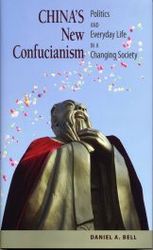 Daniel A. Bell, China’s New Confucianism: Politics and Everyday Life in a Changing Society. Princeton: Princeton University Press, 2008. ISBN 978-0-691-13690-5; hardcover; 340 pages, including two appendices, notes, and bibliography.
Daniel A. Bell, China’s New Confucianism: Politics and Everyday Life in a Changing Society. Princeton: Princeton University Press, 2008. ISBN 978-0-691-13690-5; hardcover; 340 pages, including two appendices, notes, and bibliography.
Confucius, as we all know, is making a comeback in China. The ancient sage and his teachings are being called upon to endorse the drive for a “harmonious society” and to buttress the legitimacy of a government groping for an ideology to replace Marxism which many in China consider to be bankrupt.
Writing with admirable clarity and conciseness, Daniel Bell explores the rapidly-growing influence of some aspects of Confucianism in today’s China; he shows why this development is basically positive, ventures a few guesses about the future and makes some recommendations for both the Chinese and Westerners. As a serious student of the Chinese classics as well as a keen observer of modern Chinese society, he deserves our attention. Bell admits that the choice of topics and division of the material reflect his own interests and role as a professor of political philosophy at Tsinghua University in Beijing. Each of the three partspolitics, society and educationcontains three chapters.
At the outset, we should note that Bell’s “New Confucianism” is not the same as the “new Confucianism” of Mou Zongshan, Tu Wei-ming and other modern philosophers. It seems to be a more narrowly-directed political and social ethical theory based upon the moral precepts of Confucius and Mencius and on Xunzi’s writings about the role of ritual in society.
After an introduction, the author begins “From Communism to Confucianism: Changing Discourses on China’s Political Future.” He opens with the bold claim that “Nobody argues that the current political system should remain in place once the economy is developed.” It seems that “everybody” agrees that China must become, in some sense, more “democratic,” responsive to the voice of the people and free of the iron grip of the Communist Party.
“The question is: “What comes after economic development?” As a “left Confucianist” who believes in the “obligation of intellectuals to criticize bad governments and the obligation of the state to provide for the material well-being of the people,” he introduces various proposals for reform that issue from broadly “Confucian” values. Actually, he thinks that “the CCP need not abandon the commitment to communism as the long-term goal” so long as it accepts capitalism as a necessary stage before the perfect society can be
created. He is clearly not enamored with capitalism, but admits that it generates the prosperity needed to provide for the basic needs of the people which he sees as the basic role of government. He skillfully surveys different possible ways of giving voice to the people in order to win their trusta key teaching of Confuciuswhile ensuring that some sort of meritocracy provides essential wisdom and balance to governanceanother Confucian principle.
Chapter two discusses “War, Peace and China’s Soft Power,” arguing that “Chinese soft power should be based on Confucian culture.” He is not advocating the legalist-dominated version of Confucianism, however, for that has fed “authoritarian nationalism,” with its preoccupation with state sovereignty at all costs. True, China’s leaders must pursue their nation’s core interests, but Bell finds them increasingly following Confucian principles, such as compromise in order to achieve global harmony. While they are not likely to adopt the “utopian cosmopolitanism” of the Da Tong school so important in early Modern China, they may opt for “a foreign policy informed by the ideal of Grand Harmony that makes room for cultural difference [among nations] and legitimate national self-interest.”
Bell looks at the Confucian case for “humanitarian intervention” in another nation’s internal affairs and other aspects of the Confucian equivalent of the “just war theory” in the West. He observes that Chinese may not care so much for violations of human rights as they would a government’s failure to provide essential goods to its people. Meanwhile, however, before the current government can think about promoting a Confucian program of foreign relations, it must face the suspicions held against it by much of the rest of the world. A good starting point, Bell asserts, is to apologize for the June 4th incident, which would “go a long way toward restoring China’s moral credibility in the eyes of outsiders.”
For me, perhaps the most useful chapter was “Hierarchical Rituals for Egalitarian Societies.” Bell perceptively shows that the rituals for which Confucian cultures are famous actually promote greater social equality between widely-separated classes than more “democratic” practices do. His very perceptive analysis of the role of “Confucian” rituals makes a powerful case for the bonding effects of greeting practices; deference to teachers at school and to elders at meals; and group exercises and singing at work. Those who have lived in East Asia will appreciate his point.
Probably the most controversial chapter will be “Sex, Singing and Civility: The Costs and Benefits of the Karaoke Trade,” which argues that singing together in karaoke bars creates an affective bond between “guests” and “hostesses” that humanizes the sex trade and advocates for legalization of prostitution. Actually, though prostitution is morally repugnant, Bell’s proposals deserve consideration, even if they are to be rejected.
In “How Should We Treat Domestic Workers,” the author shows how the Confucian tradition of including servants as members of the family goes a long way towards preventing a harsh employer-employee dichotomy that might dehumanize the work of household helpers.
“The Politics of Sports” both chides the Chinese for being so nationalistic in their attitudes towards sports and explains how they can cheer soccer teams of other nations; he also puts the government’s pre-Olympic campaign for “civility” into Confucian perspective (the same would be true for the Shanghai Expo).
In “A Critique of Critical Thinking,” a “Professor Kong” (=Confucius) gets the better of a typical Western-style liberal in a debate about the proper goals and methods of education. It seems that requiring the young to memorize ancient classics (though not, perhaps, to attain proficiency in music) has advantages over the notion of encouraging them to speak without first having listened. The chapter on “Teaching Political Theory” shows both how remarkably open the Chinese academy can be to careful foreign teachers but also how differently teachers are regarded in China and in the West.
In the final chapter of the body of the book, Bell tells about his commitment to “being Confucian,” and tries to show “Why Confucians needn’t be old, serious, and conservative.” It seems that Confucius could be light-hearted with his students, and that his consistent focus on the past was really politically bold. Bell concludes the book with two appendices. First, there is a critique of the sensationally successful Yu Dan for “depoliticizing the Analects” and imposing her own Daoist self-help schema upon a book that is fundamentally
aimed at social and political reform. In “Jiang Qing’s political Confucianism,” he enters into dialogue with a prominent Chinese political thinker whose proposals may be too much for the government, but whose ideas for “Confucian” reform seem to Bell to have merit.
Actually, a full thirty-six pages of notes really should be considered part of the volume, since these tend to be long, detailed and quite illuminating.
Evaluation
Bell’s volume has divided reviewers. Some call it shallow and disjointed, which I agree sometimes seems to be the case; it is not completely clear why he chose the topics he did. On the other hand, lavish praise for China’s New Confucianism comes from respected scholars, including prominent Chinese intellectuals and prestigious Western publications.
After finishing the book, I tend to think that Bell has succeeded in making what could be a very dry subject quite interesting, combining political theory with specific social observation and application. The chapter on the sex industry, for example, though obviously intentionally “entertaining,” actually highlighted important issues.
What does a Christian say to all of this?
One the one hand, we can affirm such Confucian values as filial piety, deference, self-control, tolerance and the insistence that rulers must be just, fair and personally above reproach. We have long known about the bonding effects of singing and the value of rituals in which people of all classes participate as equals (one thinks of corporate confession of sin, for example).
On the other hand, perhaps China’s New Confucianism may seem shallow because Confucianism suffers from fundamental weaknesses: no solid theory of knowledge upon which to base an ethical system; a truncated view of human nature; the absence of a transcendent God to worship, fear, love and obey; the lack of sufficient motivation to do what might not be “natural” and of the strength to carry out one’s noble aspirations.
More specifically, Bell shares a fundamental optimism towards educated elites that accords with his admittedly leftist ideology and which allows him to favor a dominant role of government in promoting the people’s well-being; this has been cogently challenged in the Anglo-American tradition of limited government, based upon a conviction that all people, including those with education, are sinful.
As one scholar has noted, Confucianism has never “warmed the heart.” For that very reason, it may suffice as a political ideology to frame public discourse about national norms, but it cannot ever really become a transforming religion or a driving force to produce the sort of “harmonious society” that everyone agrees is desperately needed in China. Only one faith can fill that role.
Image credit: The Research Institution of Confucianism by kanegen, on Flickr

G. Wright Doyle
G. Wright Doyle is the director of China Institute (www.reachingchineseworldwide.org) and Global China Center (www.globalchinacenter.org), the editor of Biographical Dictionary of Chinese Christianity (www.bdcconline.net), and co-editor of Studies in Chinese Christianity, published by Wipf and Stock. For more on effective ministry among Chinese, see Reaching Chinese Worldwide, by G. Wright Doyle.View Full Bio